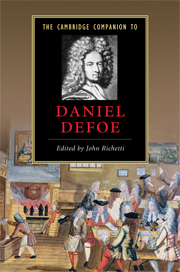Book contents
- Frontmatter
- Introduction
- 1 Defoe: the man in the works
- 2 Defoe’s political and religious journalism
- 3 Defoe, commerce, and empire
- 4 Defoe and criminal fiction
- 5 Money and character in Defoe’s fiction
- 6 Defoe’s Tour and the identity of Britain
- 7 Defoe as narrative innovator
- 8 Gender and fiction in Moll Flanders and Roxana
- 9 Defoe and London
- 10 Robinson Crusoe: varieties of fictional experience
- 11 Defoe: satirist and moralist
- 12 Defoe and poetic tradition
- Further Reading
- Index
Introduction
Published online by Cambridge University Press: 28 March 2009
- Frontmatter
- Introduction
- 1 Defoe: the man in the works
- 2 Defoe’s political and religious journalism
- 3 Defoe, commerce, and empire
- 4 Defoe and criminal fiction
- 5 Money and character in Defoe’s fiction
- 6 Defoe’s Tour and the identity of Britain
- 7 Defoe as narrative innovator
- 8 Gender and fiction in Moll Flanders and Roxana
- 9 Defoe and London
- 10 Robinson Crusoe: varieties of fictional experience
- 11 Defoe: satirist and moralist
- 12 Defoe and poetic tradition
- Further Reading
- Index
Summary
Book II of Alexander Pope's Dunciad includes an uproarious parody of the games of strength and speed featured in classical epics. The presiding goddess, Dullness, presents as a prize to the victor, the notorious publisher, Edmund Curll, a “shaggy Tap'stry” depicting Pope's satiric targets in the poem, Grub Street authors and booksellers. And at the forefront of the picture is Daniel Defoe: “Earless on high, stood unabash'd De Foe” (II, 147). Having one's ears cut off, as suggested by Pope's slanderous depiction of Defoe, was in those days a possible if rare punishment for seditious publication. Pope and the members of his elite literary circle viewed writers for hire like Defoe with contempt as nothing more than literary prostitutes who catered to degraded popular taste or produced political propaganda. Defoe had been pilloried (made to stand in humiliating and dangerous public view, hands and head in a locked frame, elevated on a pillar) for parts of three days in July 1703 for writing The Shortest Way with the Dissenters (1702), a pamphlet the government deemed incendiary. Swift, in a pamphlet in 1708, said that Defoe was “One of these Authors (the Fellow that was pilloryed, I have forgot his name) so grave, sententious, dogmatical a Rogue, that there is no enduring him.” Three hundred years or so later, however, Defoe has had the last laugh on mandarins such as Pope and Swift. Thanks partly to contemporary redactions in film (Castaway) and television (Survivor), the Robinson Crusoe story remains an enduring archetype, just as the book itself is a world classic, translated into many languages. And thanks to the novel's dominance in modern times as a literary form, Defoe is these days a major figure in the history of its development in England, with Moll Flanders (1722), A Journal of the Plague Year (1722), and Roxana (1724) along with Robinson Crusoe read as standard texts for academic study, as founding moments in the emergence of modern fiction.
- Type
- Chapter
- Information
- The Cambridge Companion to Daniel Defoe , pp. 1 - 4Publisher: Cambridge University PressPrint publication year: 2009
- 1
- Cited by

